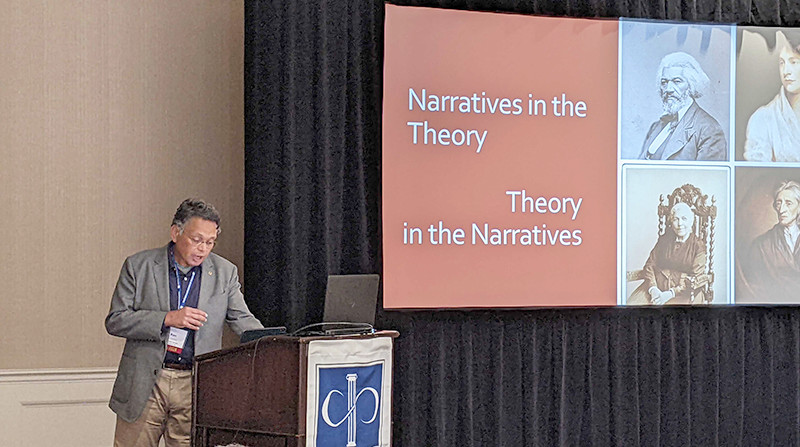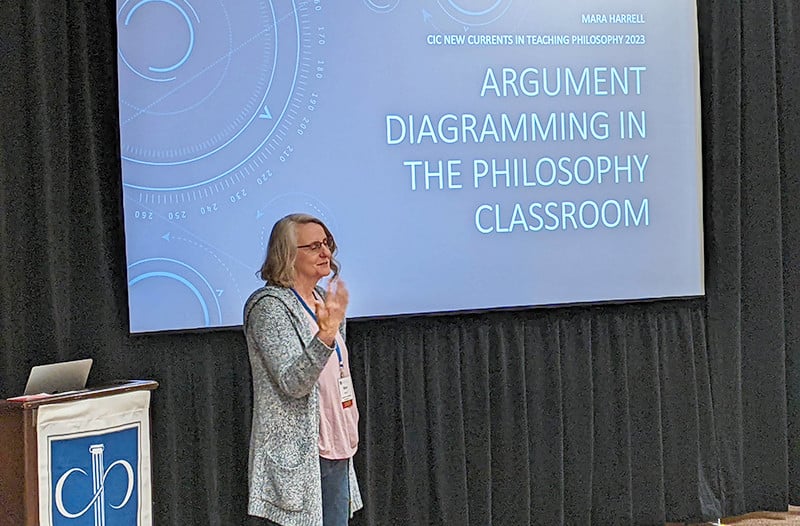Twenty-nine philosophers from CIC member colleges met in Baltimore, MD, on July 23–27, 2023, to explore “New Currents in Teaching Philosophy.” This was the third and final Institute in an annual series designed to help faculty members strengthen the philosophy programs at their institutions by offering students more diverse, compelling, and relevant courses. The program featured seminars and workshops led by philosophers who have developed especially successful courses on their own campuses, under the leadership of institute director Ned Hall, Norman E. Vuilleumier Professor of Philosophy at Harvard University (MA). The program has received generous support from the Mellon Foundation. Thanks to this support, participants will receive small implementation grants to apply what they learned during the Institute.
Participants discussed new research in their discipline, explored new teaching strategies, and considered new strategies to sustain vibrant undergraduate programs. In “Philosophy and the Good Life,” presenter Meghan Sullivan suggested that philosophy courses have untapped potential to address the college student mental health crisis by helping students “navigate young adulthood with a sense of purpose.” Several sessions focused on AI (artificial intelligence) as an intellectual challenge and a teaching challenge for philosophers. According to presenter Eric Swanson, the challenge is not “How do we use AI?” but “What philosophical skills are especially important in the age of AI?” and “How do we think about using AI with integrity?” Swanson and presenter Mara Harrell also urged participants to focus their student assignments on things that current AI systems like ChatGPT cannot do, such as in-class writing and the formal analysis of arguments. Other sessions focused on diversifying the canon of teaching texts in philosophy and specific pedagogical approaches.
An important topic of discussion throughout the Institute was raised by Tim Weldon, professor of philosophy at the University of St. Francis (IL), during the opening session: “How do we communicate the value of philosophy in the context of higher education as career preparation?” Although the participants did not fully solve this conundrum by the end of the week, they did leave Baltimore equipped with “many new ideas [to] incorporate into my classes and departmental work” (according to the results of a post-Institute evaluation survey) and a renewed sense that “asking good questions is a key philosophical skill” and a key life skill for any student, according to participant Getrude Gonzales de Allen, associate professor of philosophy at Spelman College (GA).
As one participant later reported, the Institute will “help me make some changes to my teaching which I think are going to be very helpful. This is just what I was hoping for, but I wasn’t expecting nearly as much help as I received.”
Themes and Presenters
Philosophy and the Good Life
Meghan Sullivan, Wilsey Family College Professor of Philosophy, University of Notre Dame (IN)
Teaching (Philosophy) in the Age of Artificial Intelligence
Eric Swanson, Professor of Philosophy and Linguistics, University of Michigan (MI)
Narratives of Freedom and Justice
Ronald R. Sundstrom, Professor of Philosophy, University of San Francisco (CA)
Argument Mapping in the Philosophy Classroom
Mara Harrell, Teaching Professor of Philosophy, University of California San Diego (CA)
Building a Vibrant Philosophy Program
John Rudisill, Associate Professor of Philosophy and past department chair, The College of Wooster (OH)
Elizabeth Schiltz, Raju Chair of East-West Philosophy, The College of Wooster (OH)
Rethinking the ‘History of Philosophy’ Course
Alison Peterman, Associate Professor of Philosophy, University of Rochester (NY) (unable to present due to illness)





